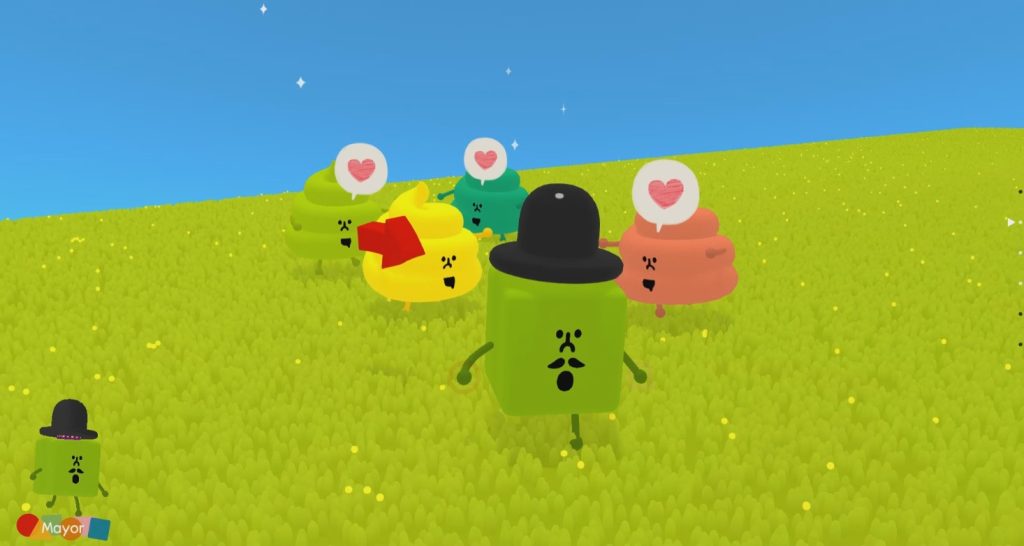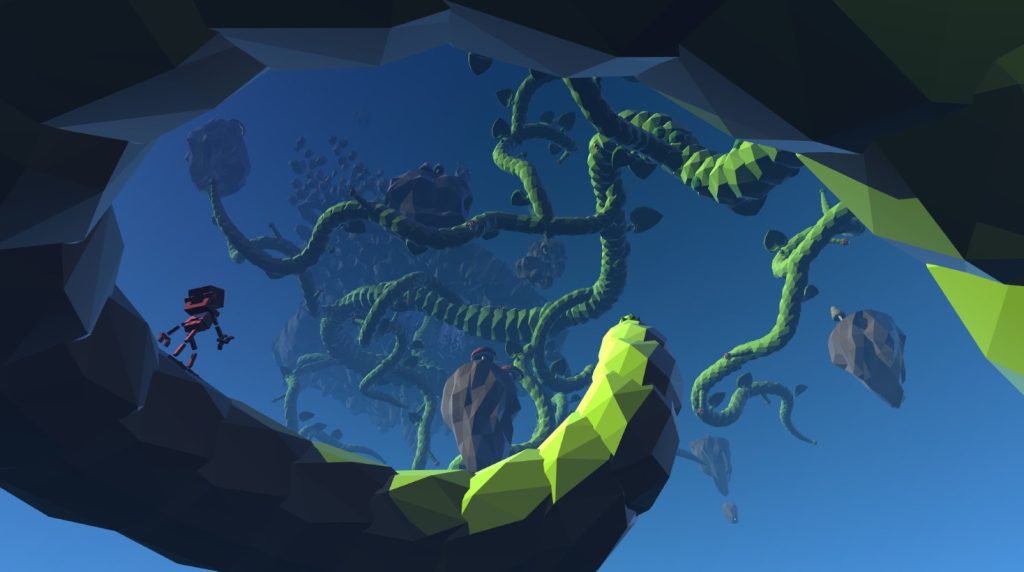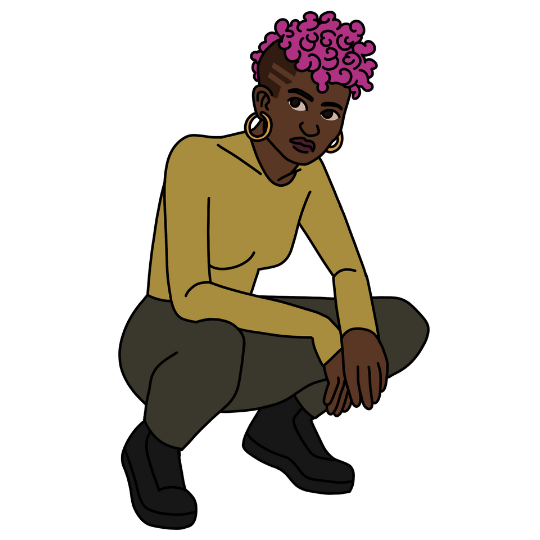Hub World: Stress Relieving Games and Tips from our Community
Posted: 25 Apr 2023Hub World is back, and this month we’re looking to our community for their suggestions for Stress Awareness Month. More specifically, which stress relieving games would they recommend, and what helps keep their stress levels from bubbling over?
Stress is a part of everyone’s life, naturally fluctuating as we navigate our experiences and grow. But how can we use games as a way to manage stress? What other things can we adopt in our routines to reduce stress? Here’s what the Safe In Our World community had to say.
Stress Relieving Games
One game that kept cropping up for this section was Dorfromantik – a peaceful building strategy and puzzle game where you create a beautiful and ever-growing village landscape by placing tiles. Suggested by Hannah Rutherford, EllieJoyPanic, Alex Gate and Bardintheyard, Dorfromantik seems to be a popular choice for simply switching your brain over to a more serene and passive headspace.
Dorfromantik was one of the first games I downloaded when I got my computer, and I’ve put a lot of hours into it since. It is so immersive, it allows you to leave and come back at your convenience, and it allows you the time to just sit and enjoy the world you’ve built. – Bard
“When I get stressed, I begin to try and fix things in my brain and end up missing the world around me,” Bard continued, “my method for battling this is deciding that the moment I’m in is going to become a core memory and take time to notice the little things for a moment. The smell of the air, the ground beneath my feet, the sounds within my walls. Even if it doesn’t become something I remember forever, it gives me the opportunity to firmly put myself present in the world and recognize I exist, I matter, and I’m here. Taking those few seconds to recenter everything lets me catch my breath and tackle obstacles better.”
“I love Dorfromantik! It’s a very cozy, no time limit, city building puzzle game that’s GORGEOUS. In the evenings, I play it in front of the TV, and it’s really good at helping me unwind. I find trying to match up all the biomes on the tiles really relaxing, and try to see how big I can make my landscape before I run out of tiles.” – Hannah

“My current go-to game for stress relief is Dorfromantik, a comfy puzzler/countryside builder, a big warm hug in video game form. Its soundtrack is soothing and relaxing with gentle ambient nature sounds, it has charming and cozy visuals, and the puzzle aspect is taxing enough that it sufficiently occupies my brain enough to take my mind off any stresses and worries.” – Ellie
It’s easy to get lost in the worlds you build and get a release from the troubles that may be weighing down on you. – Alex
Emmalition leans towards Tetris Mobile, finding peace in clearing Tetriminoes:
It’s my go-to stress relief because it requires so much attention and focus when it speeds up that I can’t think about anything else, including my woes and worries! Plus the constant flow of clearing lines makes my brain happy. Although I’m now seeing blocks everywhere I look! Emma also encourages talking to a friend/partner during times of stress. “Usually my husband will help me put my stresses into perspective and help resolve them if possible. Never be afraid to lean on loved ones for help.”
Puzzle games seem to be a theme for our Community, as Karen suggests the short puzzler ‘Wattam’.
“A puzzle game that isn’t very long but I’ve found to be wholesome, encourages you to just try strange things, and has plenty of delightful moments is Wattam. You start off as one character who’s all alone but through trial and error, you make more and more friends! Some of the secret ways to discover more friend are truly wacky, but I think that’s what makes the game so charming. The characters are cute too!”

For Connor, Terra Nil has been his current go-to game to relax, through reverse-city building a wasteland into a thriving eco-system. “The art and music are both lovely and relaxing. The levels are random, bite-sized and don’t put much pressure on the player. It really helps you unwind.”
Richard Breslin commented that he can have any number of go-to games to relieve stress. More often than not it’s likely to be an open-world game like Horizon Forbidden West, Death Stranding or Yakuza.
“The reason is that I can be free from any mission structure and explore or venture wherever my intrigue takes me. Dealing with stress can be different given any other day. However, I often tell myself that tomorrow is a new day and an opportunity to reset my brain, so to speak. It’s easier said than done, but it can help sometimes.”
Pastelbat went back to their classic comfort game – Destiny 2 (which, they knew nobody would be surprised at!). You can listen to why Destiny means so much to them on one of our podcast episodes here.
“It just brings me so much joy and there’s activities I can do without having to think too much. Just being able to redo activity without focusing makes me calm… also some voice lines pulls me out of daydreams.”
Grow Home, recommended by Harry Stainer, is a conflict-free chilled experience allowing him to ground himself; “I love it’s beauty, simplicity and how calming growing a plant back up to your spaceship is. It’s always a game I go back to when I get overwhelmed.” Harry also comments on finding any good media with a great story can be an excellent escape during particularly stressful moments.

It’s not all relaxing games for the Safe In Our World space, as it’s not uncommon for gamers to run to traditionally challenging or stressful games to counter real-world stress! Jerreau Henry illustrates this with Resident Evil 4: New Game+.
Yes, Resident Evil 4 is technically a horror game, but after multiple playthroughs, it feels more like a cheesy action movie meets Shaun of the Dead! Leon’s one-liners, ridiculous suplex moves, and his famed attaché case all make RE4 a fun and rewarding game to de-stress to.
We’ve had a number of previous cases for horror and stress relief, such as this article on horror being a safe space from freelance writer Alicia, or ‘how stressful games can be relaxing‘ from Ruby Modica.
So, what can we do?
For most of our community, the suggestions on ways to relieve stress were similar, drawing on nature-based relaxation and hobbies to get lost in. For Pastelbat, it’s scrapbooking K-pop and reading manga to reduce stress outside of gaming time.
Our community also shared the importance of leaning on others sometimes. It doesn’t always need to be solution focused conversations, with Alex sharing that simply explaining the issues that you’re facing can present clarity and a weight being lifted. However, breaking down problems or reasons for stress with logical step-by-step solutions where possible might put our minds at ease. Jerreau highlighted value in taking moments to check in with himself, and practicing self-care and self-kindness.
Connor emphasizes how small breaks are as important as longer breaks: “Try to at least stand up and get away from your screen for a few minutes. Going for a walk also does wonders. I’m pretty notorious for feeling guilty when trying to relax, it’s something I struggle with but those two help keep me in check.”
Managing Stress at Work
We also chatted to Ubisoft’s HR Projects Manager for the Reflections and Leamington studios in the UK, Julia Melvin, who focuses a lot of their work on wellbeing in the workplace, who offered some great advice for those looking to delve into more nuanced support at work.
“We all experience stress in our lives but we have a limited capacity for how much stress we can reasonably manage at one time. Having helpful coping strategies and some time set aside for self-care can help us alleviate stress and ensure we are able to be resilient and cope with whatever comes up. But if stress becomes pervasive and overwhelming and we have no time or space to set aside for self-care and relaxation, we may experience a reaction to the stress and it can quickly become a much more difficult problem to manage.
“Prolonged stress and overwhelm can drastically affect our behaviours, our moods and our health in general – our sleep patterns, eating habits, personal care and hygiene and relationships with others may be impacted. We may start to experience physical sensations of stress in our bodies in the form of headaches, back pain, fatigue or digestive issues and we may find ourselves feeling less tolerant of others, and less able to cope with events as they arise — even a seemingly minor thing can seem like a huge deal when we are consumed by stress because our resilience has been compromised.
The longer we persist and allow the stress to mount, the more difficult it becomes to manage.
“We each have a different ‘stress signature’ – a collection of signs that things are starting to become too much. It’s important to become aware of what our individual stress response looks like and to give some other people we trust permission to let us know if they notice our signs. For example, some people may get quiet and withdrawn while others may become more irritable and argumentative, we are all unique. When we notice our individual signs, it’s time to take a step back and give ourselves additional space, and ask for help if we need to. When we are feeling stressed, we are less able to focus on the work at hand, things may take longer and the quality of our work can start to drop so we are less productive.

“Stress can also be contagious – when one person on a team is feeling overwhelmed, it has a knock-on impact to others they interact with as well. This can lead to strained relationships and even more people in need of stress relief and support. This is why addressing stress in the workplace is so important, both in terms of prevention and support. Carrying our regular stress risk assessments for your team is one great way to ensure you are considering any possible pressure points and forming an action plan around how you will address them to mitigate work-related stress and aid prevention. Having support in place for anyone who needs it and ensuring there is regular signposting to the support that is available is vital to aid early interventions.
“The importance of making time for ourselves cannot be underestimated. We have to actively release the pressure valve on an ongoing basis and find ways to boost our spirit like being outdoors, playing games, seeing family and friends, building Lego, reading a book or watching a movie. We need this as maintenance every day, to keep ourselves feeling our best. But as stress rises, we need even more space to recharge and recover than usual as we can find it increasingly harder to switch off and get engaged in activities, it takes longer for us to settle and get engaged in something when we have a lot on our minds.
“It’s also important that our self-care strategies are flexible and can be adapted to suit our needs as we may need different things at different times. Sometimes self-care looks like getting together with friends for a great night out or a fun gaming session, and sometimes it looks like having time alone to rest and reflect, take a nap or read a book. If we feel restless and agitated and can’t sit still, we can go for a walk. If we feel exhausted, we can watch a favourite movie we haven’t seen in ages instead. Listening to our own needs is the key. Self-care that is adaptive and flexes around our needs can help us relieve stress so that we have more room and resilience to cope with life’s challenges as they arise.”

